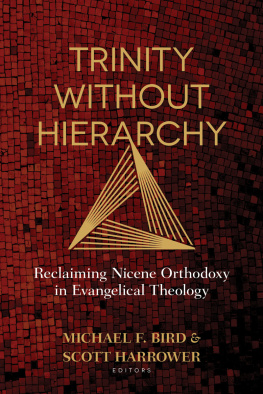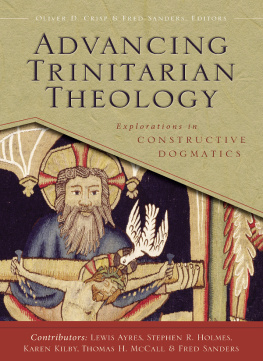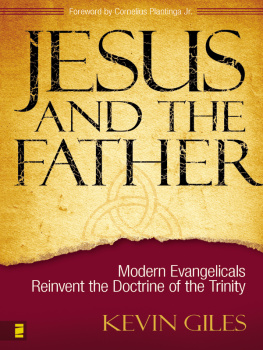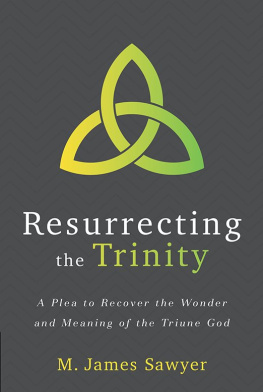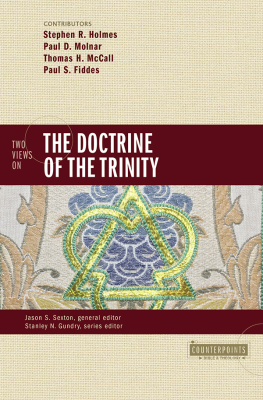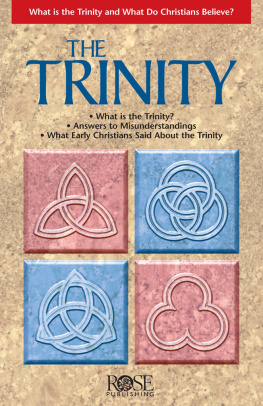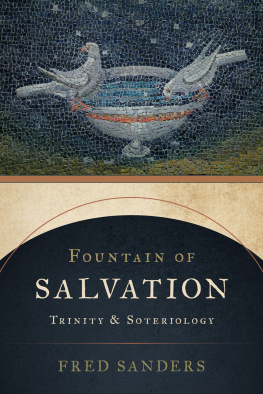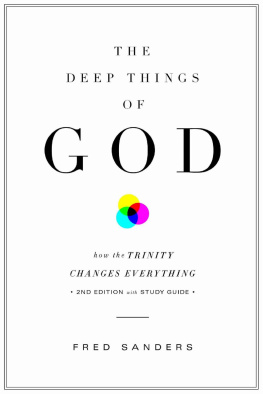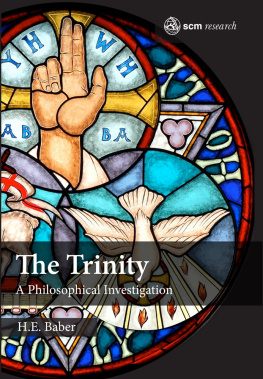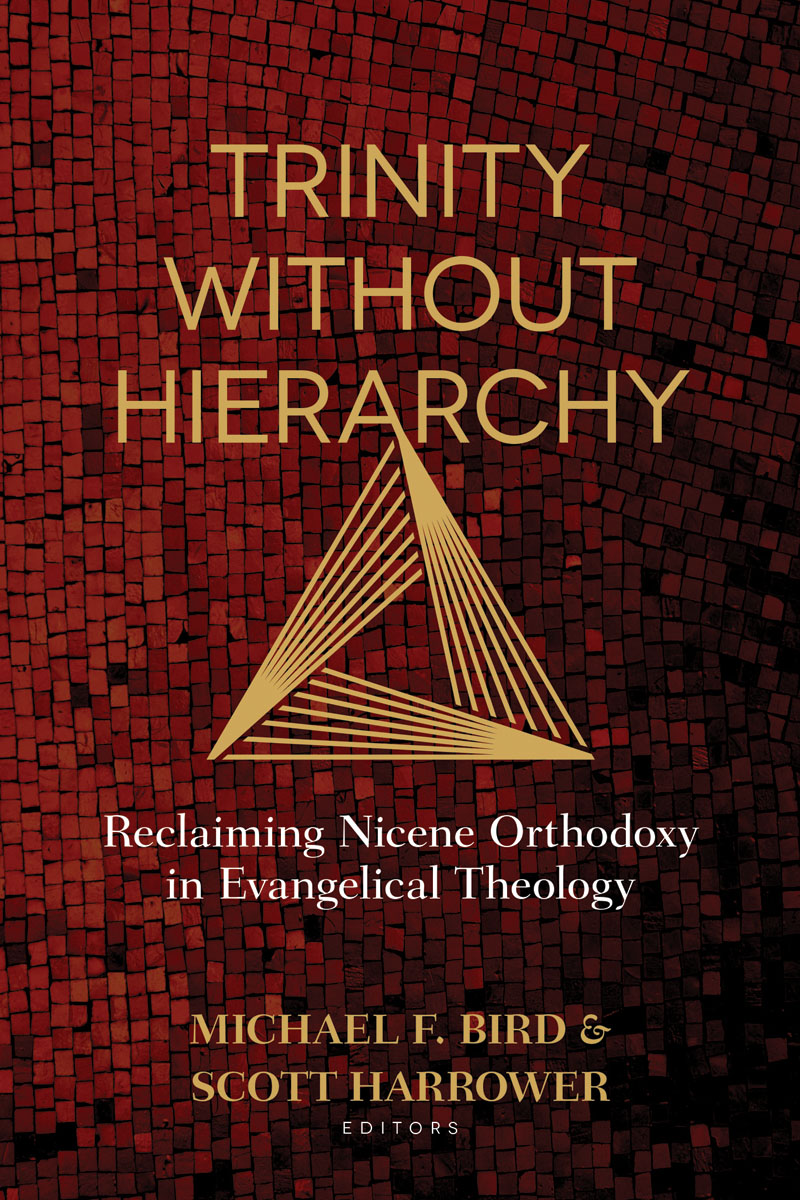
Written as a contribution to an important evangelical debate, this erudite volume deserves a readership across ecclesial divisions. All Thomists, for example, will find Tyler Wittmans brilliant account of Aquinass Trinitarian theology to be necessary reading. May this volumes Trinitarian reflections have a healing and unitive effect, not only among the evangelicals involved in the debate, but also across ecclesiastical lines so that we may all be one!
Matthew Levering, James N. and Mary D. Perry Jr. Chair of Theology, Mundelein Seminary, and coeditor of The Oxford Handbook of the Trinity
This new collection of Trinitarian studies is theologically sensitive, biblically attuned, and historically concerned. Everyone interested in the future of Trinitarian theology within evangelical Protestantism will find this book a good and encouraging guide.
Lewis Ayres, Durham University and Australian Catholic University
In recent years, the waters of evangelical Trinitarian theology have been roiled and muddied by unfortunate debates about the subordination of the Son. The very fine essays collected in this volume make genuine progress in exegetical, biblical, as well as historical and systematic theology, and they will do much to help bring an end to this debate.
Thomas H. McCall, Professor of Biblical and Systematic Theology, Trinity Evangelical Divinity School and Professorial Fellow in Exegetical and Analytic Theology, University of St Andrews
Orthodoxy matters. Who is the God we are confessing, worshipping, and living for in faith and obedience? Who is the God whom we long to share eternal communion with on the new heaven and the new earth? What theological cultures are we receiving? It is incumbent upon the church to retrieve an orthodox confession and pass that down to the next generation. Trinity without Hierarchy addresses the different academic, dogmatic, historic, and practical camera angles of a contemporary debate regarding whether there is hierarchal distinction between the persons of the Godhead. The impact of this teaching has already left a heavy fingerprint on the church. As a laywoman, I see who pays the price when academics try to apply an unorthodox view of the Trinity to gender relations. What will the continuing intergenerational impact be if we do not call for renewal of the orthodox faith?
Aimee Byrd, author of Why Cant We Be Friends? and No Little Women, cohost of Mortification of Spin
First, open theism; now, eternal functional subordination of the Son. Evangelical theology has shown itself to be soft at the very point on which the gospel depends: the doctrine of the triune God. This collection of essays rightly reminds us that the primary purpose of Trinitarian theology is to enable the right reading of Scripture and to preserve the integrity of the gospel message, not to serve as a template for human social relations. The authors of Trinity without Hierarchy carefully examine key New Testament texts, as well as the work of past and present theologians. The result is a compelling and comprehensive case that evangelicals are most biblical when they adhere to the catholic and orthodox tradition.
Kevin J. Vanhoozer, Research Professor of Systematic Theology, Trinity Evangelical Divinity School
Trinity without Hierarchy: Reclaiming Nicene Orthodoxy in Evangelical Theology
2019 by Michael F. Bird and Scott Harrower
Published by Kregel Academic, an imprint of Kregel Publications, 2450 Oak Industrial Dr. NE, Grand Rapids, MI 49505-6020
All rights reserved. No part of this book may be reproduced, stored in a retrieval system, or transmitted in any form or by any meanselectronic, mechanical, photocopy, recording, or otherwisewithout written permission of the publisher, except for brief quotations in printed reviews.
All Scripture quotations, unless otherwise indicated, are from the Holy Bible, New International Version, NIV. Copyright 1973, 1978, 1984, 2011 by Biblica, Inc.TM Used by permission of Zondervan. All rights reserved worldwide. www.zondervan.com
Scripture quotations marked ESV are from The Holy Bible, English Standard Version (ESV), copyright 2001 by Crossway, a publishing ministry of Good News Publishers. Used by permission. All rights reserved.
Scripture quotations marked NASB are from the NEW AMERICAN STANDARD BIBLE, Copyright 1960, 1962, 1963, 1968, 1971, 1972, 1973, 1975, 1977, 1995 by The Lockman Foundation. Used by permission.
Scripture quotations marked NRSV are from the New Revised Standard Version Bible, copyright 1989 the Division of Christian Education of the National Council of the Churches of Christ in the United States of America. Used by permission. All rights reserved.
Scripture quotations marked KJV are from the King James Version. Public domain.
The Greek font GraecaU is available from www.linguistsoftware.com/lgku.htm, +1-425-775-1130.
ISBN 9780825444623
Printed in the United States of America
19 20 21 22 23 / 5 4 3 2 1
Graham Cole, in thankful appreciation, for his leadership and service to Christ the King.
Contents

PREFACE
Theologians of a Lesser Son
MICHAEL F. BIRD
I entered the debate about the eternal functional subordination of the Son to the Father with two articles coauthored with my former colleague Robert Shillaker. There we argued contra Kevin Giles that an economic submission of the Son to the Father did inform relationships within the immanent Trinity; and we concurrently argued contra Bruce Ware and Wayne Grudem that this had very limited relevance to issues of gender roles, and that furthermore we should probably drop the language of subordination since it was flirting with Arianism.
However, after reading and rereading several volumes by complementarians, where the language of subordination and hierarchy are championed, I am now convinced that Grudem, Ware, and others were arguing for something analogical to a semi-Arian subordinationism.
Problems abound with this subordinationist and/or quasi-homoian complementarianism view of the Trinity, not least in how advocates describe the theological lay of the land and map their own position within it. For a start, one wonders if it wise to divide perspectives into so-called feminist views of the Trinity in contradistinction to so-called complementarian views of the Trinity.description of feminist and complementarian views of the Trinity do not represent historical categorizations or even correspond to contemporary schools of Trinitarian thought. Thus, to insist on views of gender roles as the single criterion for classifying Trinitarian formulations is a strange move. It is also a categorization that is, to be frank, utterly bizarre in that it subordinates Trinitarian doctrine to a very narrow band of anthropology (i.e., gender roles); it even turns out to be a meaningless categorization when it is realized that complementarian and egalitarian advocates both can affirm a non-subordinationist Trinitarian theology.
The problem, as I see it, is that a quasi-homoianism was drafted into the complementarian narrative by a small cohort of theologians in order to buttress their claims about gender roles and to define what distinguishes them as complementarians. In which case, something like homoianism is being utilized as scaffolding for complementarianism with the result that a defense of complementarianism involves a defense of a quasi-homoianism. Now it is quite clear that not all complementarians will allow their views of gender roles in the church to be tethered to this quasi-homoianism since many complementarians will regard such a formulation as extrinsic to their accounts of gender roles and will simultaneously wish to affirm an orthodox and Nicene Trinitarianism in which there is no subordination. Indeed, this book proves that very point since it comprises of several essays written by a mixture of egalitarian and complementarian scholars who are all singularly united in their articulation of a non-subordinationist and non-hierarchical account of intra-Trinitarian relationships. This is fatal to the quasi-homoianistic brand of complementarism because it demonstrates that a Nicene and orthodox Trinitarian theology ultimately transcends and even unites those with different convictions about gender roles, marriage, and family. Clearly, then, one does not have to hold to a homoian and hierarchical view of the Trinity in order to be complementarian.
Next page
